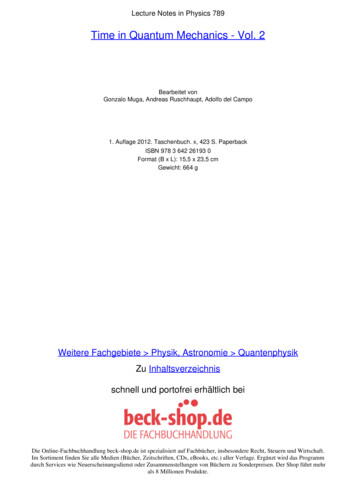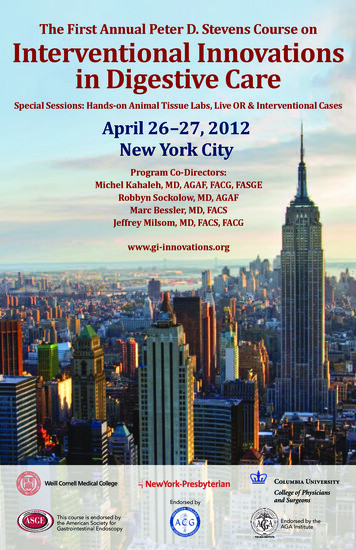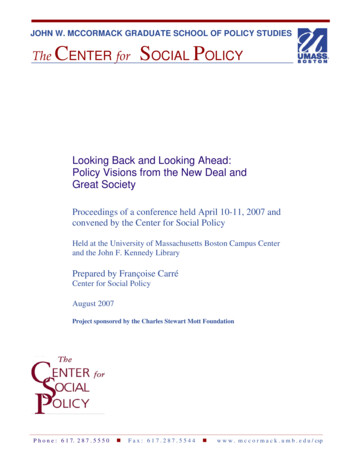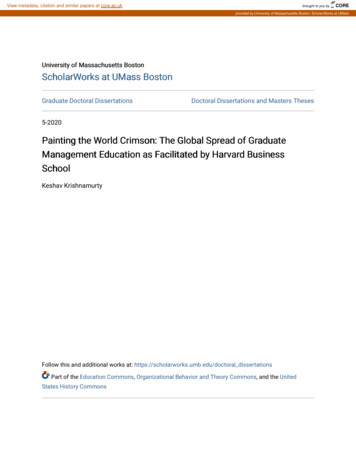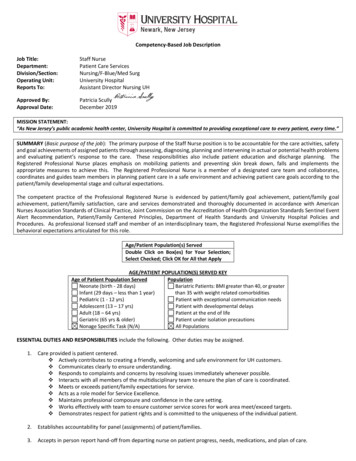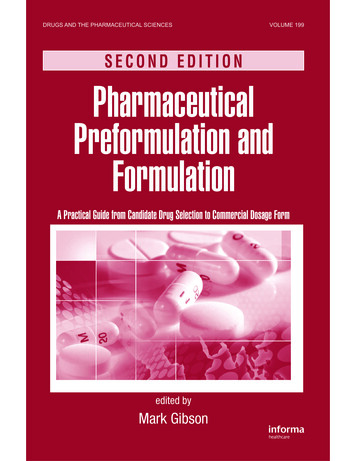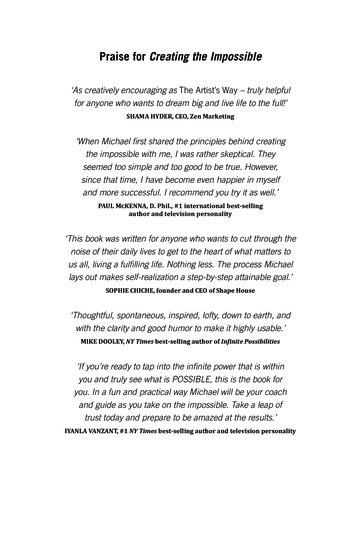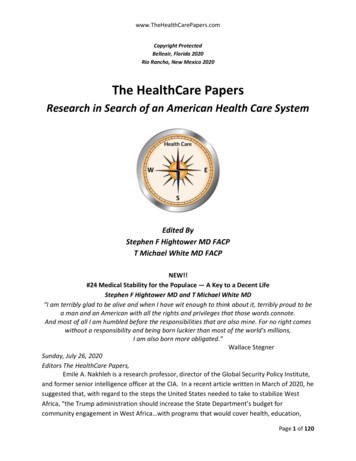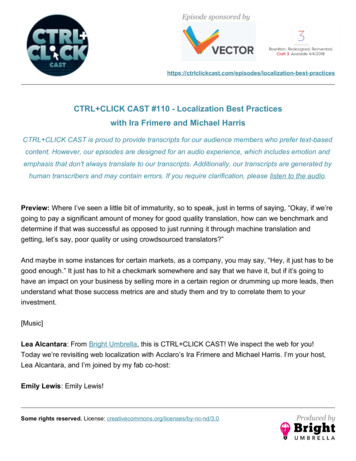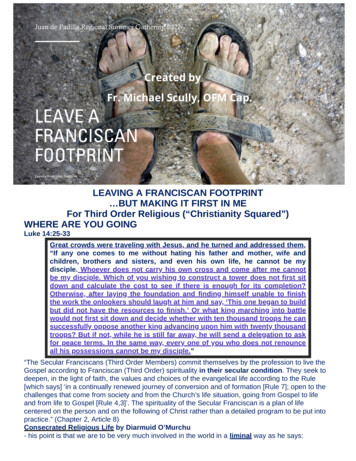
Transcription
Created byFr. Michael Scully, OFM Cap.LEAVING A FRANCISCAN FOOTPRINT BUT MAKING IT FIRST IN MEFor Third Order Religious (“Christianity Squared”)WHERE ARE YOU GOINGLuke 14:25-33Great crowds were traveling with Jesus, and he turned and addressed them,“If any one comes to me without hating his father and mother, wife andchildren, brothers and sisters, and even his own life, he cannot be mydisciple. Whoever does not carry his own cross and come after me cannotbe my disciple. Which of you wishing to construct a tower does not first sitdown and calculate the cost to see if there is enough for its completion?Otherwise, after laying the foundation and finding himself unable to finishthe work the onlookers should laugh at him and say, ‘This one began to buildbut did not have the resources to finish.’ Or what king marching into battlewould not first sit down and decide whether with ten thousand troops he cansuccessfully oppose another king advancing upon him with twenty thousandtroops? But if not, while he is still far away, he will send a delegation to askfor peace terms. In the same way, every one of you who does not renounceall his possessions cannot be my disciple.”“The Secular Franciscans (Third Order Members) commit themselves by the profession to live theGospel according to Franciscan (Third Order) spirituality in their secular condition. They seek todeepen, in the light of faith, the values and choices of the evangelical life according to the Rule[which says] ‘in a continually renewed journey of conversion and of formation [Rule 7]; open to thechallenges that come from society and from the Church’s life situation, going from Gospel to lifeand from life to Gospel [Rule 4,3]’. The spirituality of the Secular Franciscan is a plan of lifecentered on the person and on the following of Christ rather than a detailed program to be put intopractice.” (Chapter 2, Article 8)Consecrated Religious Life by Diarmuid O’Murchu- his point is that we are to be very much involved in the world in a liminal way as he says:
[ The word comes from the noun limen, which refers to the point at which a physiological orpsychological effect begins to be produced. In its most common extended meaning now, itdescribes a state, place, or condition of transition.]“In Religious Life terms, the primary purpose of liminality is what Van Kaam calls value-radiation.On behalf of the human community, we Religious are missioned to be people of value, acting ascatalysts on behalf of the people.”John Paul II, Vita Consecrata (which every one of you should read but bracketing the “specificFirst and Second Order overtones (and old religious taboos” that O’Murchu points out) calls our jobas religious, “the prophetic task of recalling and serving the divine plan for humanity” and providingthe baptized with a more vivid reminder (Christianity squared) of Gospel values (right in line withyour Constitutions/Rule)- our “making a Franciscan footprint” is in the sense of “I want to understand that there are manythings about what I have promised (as part of liminality [value radiation]) that I am not living out” Omer Englebert, St. Francis of Assisi“At Spoleto, where he stopped for the night, the mysterious voice spoke to him again in his sleep.“Francis,” it said to him, “where are you going like this?”“I am going to fight in Apulia,” replied the young man.“Tell me,” the voice continued, “From whom can you expect most, the master or the servant?”“From the master, of course!”“Then why follow the servant, instead of the master on whom he depends?”“Lord, what would You have me do?”“Return to your own country. There it shall be revealed to you what you are to do, and you will cometo understand the meaning of this vision.”Francis awoke, and unable to go back to sleep, spent the rest of the night in reflection. Abandoninghis project, he took the road back to Assisi the next day. He was about twenty-five years old.”Natasha Bedingfield’s “Unwritten”“I am unwritten, can’t read my mind, I’m undefined. I’m just beginning, the pen’s in my hand, endingunplanned. Staring at the blank page before you, open up the dirty window, let the sun illuminatethe words that you could not find. Reaching for something in the distance, so close you can almosttaste it. Release your inhibitions, feel the rain on your skin, no one else can feel it for you, only youcan let it in. No one else can speak the words on your lips, drench yourself in words unspoken, liveyour life with arms wide open. Today is where your book begins, the rest is still unwritten.”M. Scott Peck, The Road Less Traveled- definition of maturity: a willingness to growAm I really making the effort to grow in my spiritual life? Can I point to some evidence of itright now?
LIVING IN “WHAT YOU NEED”Matthew 19:16-22Now someone approached him and said, “Teacher, what good must Ido to gain eternal life?”* He answered him, “Why do you ask me aboutthe good? There is only One who is good. If you wish to enter into life,keep the commandments.” He asked him, “Which ones?” And Jesusreplied, “‘You shall not kill; you shall not commit adultery; you shallnot steal; you shall not bear false witness; honor your father and yourmother’; and ‘you shall love your neighbor as yourself.’” The youngman said to him, “All of these I have observed. What do I still lack?”Jesus said to him, “If you wish to be perfect, go, sell what you haveand give to the poor, and you will have treasure in heaven. Then come,follow me. When the young man heard this statement, he went awaysad, for he had many possessions. Poison, Something To Believe In“I drive by the homeless sleeping on a cold dark street, like bodies in an open grave,underneath the broken old neon sign that used to read “Jesus Saves.” A mile away live the richfolks, and I see how they're living it up. While the poor, they eat from hand to mouth, the rich isdrinkin' from a golden cup. And it just makes me wonder: why so many lose, so few win. Give mesomething to believe in.”David Wann and John de Graef, Affluenza“Possession overload is the kind of problem where you have so many things you find your life isbeing taken up by maintaining and caring for things instead of people. Everything I own owns me.People feel sad and what do they do? They go to the mall, and they shop, and it makes them feelbetter, but only for a short time. Tragedy is wanting something badly, getting it and finding itempty. Addiction to stuff is not easily understood. The goal is to get back to a place of perceivedpower and carefree abandonment.”Omer Englebert, St. Francis of Assisi“Of all virtues, poverty is the one that was to impart its originality to the Franciscan Order andconstitute its ‘true foundation.’“Voluntarily poor, one may be from philosophy or asceticism, for reasons of zeal, of charity, andothers still. But Francis was poor from love. He made himself poor because his beloved Christ hadbeen poor. He espoused Poverty because she had been ‘the inseparable companion of the MostHigh Son of God,’ and because for twelve centuries she had wandered about forsaken.“In truth, it was a wonderful union. Never was a loved woman the object of a more chivalrous andloyal cult, of more impassioned and more charming homage.”Leonardo Boff, Francis of Assisi“Francis achieved an incommensurable liberation of the poor. What makes poverty inhuman is the scorn, rejection, exclusion from human life together, the permanent brainwashing of anegative and unqualified image of the poor, developed by non-poor classes. The poor end bythinking of themselves as despised. No one is on their side.“The liberation achieved by Francis consisted in being a rich young man, the flower of thebourgeois society of Assisi, who took on the condition of the poor and lived like a poor man. Heserved the poor, touched them, kissed them, sat at the same table with them, felt their skin, lived inphysical communion with them. These contacts humanize misery; they give back to the poor thesense of their human dignity, never lost but negated by the society of the healthy .
“Francis has left us with a serious question: is it possible, as he tried to do, for any group to live theGospel utopia of radical poverty in a way of achieving a real fraternity?”Diarmuid O’Murchu, Consecrated Religious Life“The new vision I refer to has justice-making as a core, central element. Although all the churchesand religious adopt this as a key value, it is given a great deal of rhetoric, but not much practicalexpression .[We have] a state of affairs in which the goods of creation are not fairly distributed toeverybody’s advantage. And the motivation behind such work [to correct it] is the conviction,variously expressed, that God wants everybody treated equally and fairly. It is at this liminaljuncture that the Religious must stand—unashamed for what he/she espouses, and unrelenting inthe prophetic stance he/she is required to adopt.”Secular Franciscan Constitutions, (commenting on the Rule, chapter 11) pledging themselves to“reduce their own personal needs so as to be better able to share spiritual and material goods withtheir brothers and sisters, especially those most in need”Apostolic Exhortation on the Renewal of Religious Life (Evangelica Testificatio)“In a civilization and a world marked by a prodigious movement of almost indefinite material growth,what witness would be offered by a religious who let him/herself be carried away by anuncurbed seeking of his/her own ease, and who considered it normal to allow him/herselfwithout discernment or restraint everything that is offered him/her? At a time when there is anincreased danger for many of being enticed by the alluring security of possessions, knowledge andpower, the call of God places you at the pinnacle of the Christian conscience.” (19)If someone would say, “Prove to me that you are poor,” how would you answer?
ARE YOU SAVING YOUR SOUL?John 21:20-25Peter turned and saw the disciple following whom Jesus loved, the onewho had also reclined upon his chest during the supper and had said,“Master, who is the one who will betray you?” When Peter saw him, hesaid to Jesus, “Lord, what about him?” Jesus said to him, “What if Iwant him to remain until I come? “What concern is it of yours? Youfollow me.” So the word spread among the brothers that that disciplewould not die. But Jesus had not told him that he would not die, just“What if I want him to remain until I come? What concern is it ofyours?”It is this disciple who testifies to these things and has written them,and we know that his testimony is true.” There are also many otherthings that Jesus did, but if these were to be described individually, Ido not think the whole world would contain the books that would bewritten.Jewel, “Who Will Save Your Soul”“Another doctor’s bill, another lawyer’s bill, another cute cheap thrill. You know you love him ifyou put him in your will. Who will save your soul; who will save your soul after all the lies that youtold. Who will save your soul if you won’t save your own? We call religion our friend. We’re soworried about saving our souls, afraid that God will take His toll that we forget to begin. There areaddictions to feed and there are mouths to pay, so you bargain with the devil, say you’re okay fortoday.” If we leave out the denial of self, what happens?- the chances are that even as we take up the cross and follow Jesus’ thoughts, we will do it in aselfish way What happens if we leave out “taking up the cross”?- chances are here, that even though we admit our selfishness and try to follow Jesus’ ways- we will not face the crosses that are part of this world, the pain and suffering which are alwayspresent in one form or another“Apollo 13”-when everything was going wrong, the Director of Operations, Gene Krantz said, we have to“work the problem”- he took everything that the trapped astronauts had in their capsule, through them on a table for hisengineers, and said those words—work the problem, figure out from what you have exactly whatthey have to do And, what if we leave the third part of Jesus’ following: namely, following Jesus’ steps?- well, here, we have denied ourselves, and we have taken up the crosses of every-day living- but we don’t have a guide—namely, Jesus and consequently FrancisWhat should I do the rest of this year to improve my life as a Franciscan disciple?
BEING AN THE “EXPERT” ON THE EUCHARIST1 Corinthians 11:17-29In giving this instruction, I do not praise the fact that your meetings are doingmore harm than good. First of all, I hear that when you meet as a church thereare divisions among you, and to a degree I believe it; there have to befactions among you in order that (also) those who are approved among youmay become known. When you meet in one place, then, it is not to eat theLord’s supper, for in eating, each one goes ahead with his own supper, andone goes hungry while another gets drunk. Do you not have houses in whichyou can eat and drink? Or do you show contempt for the church of God andmake those who have nothing feel ashamed? What can I say to you? Shall Ipraise you? In this matter I do not praise you. For I received from the Lordwhat I also handed on to you, that the Lord Jesus, on the night he washanded over, took bread, and, after he had given thanks, broke it and said,“This is my body that is for you. Do this in remembrance of me.” In the sameway also the cup, after supper, saying, “This cup is the new covenant in myblood. Do this, as often as you drink it, in remembrance of me.” For as oftenas you eat this bread and drink the cup, you proclaim the death of the Lorduntil he comes. Therefore whoever eats the bread or drinks the cup of theLord unworthily will have to answer for the body and blood of the Lord. Aperson should examine himself, and so eat the bread and drink the cup. Foranyone who eats and drinks without discerning the body, eats and drinksjudgment on himself.Capuchin Spirit and Life, John Baptiste of Meerle, OFM Cap.“Imitate the example of many of our blessed brethren and on awakening in the morning let yourfirst thought be on the approaching visit of Jesus to your soul in holy Communion. Endeavor toexcite above all lively sentiments of faith in the real presence of Jesus in the holy sacrament, and offervent desire to receive him in your heart. From these sentiments of faith and desire will spring upin your heart affection and humility, confidence and love to him whom you will soon bid welcome.Reflect seriously upon the following:Who is he that comes to me?Who am I to whom Jesus comes?How does he come to me?Why does he come to me?”Vita Consecrata, Pope John Paul II, # 55“In whatever activity or ministry they are involved, consecrated persons should remember thatbefore all else they must be expert guides in the spiritual life” And: Apostolic Exhortation on the Renewal of Religious Life (Evangelica Testificatio, 1971)“There is surely no need to remind you of the special place occupied in your community life by theChurch’s liturgy, the center of which is the Eucharistic Sacrifice, in which interior prayer is linked toexternal worship. At the moment of your religious profession you were offered to God by theChurch, in close union with the Eucharistic Sacrifice. Day after day this offering of yourselvesmust become a reality, concretely and continuously renewed. Communion in the Body andBlood of Christ is the primary source of this renewal; by it may your will to love truly, and even to thesacrifice of your lives, be unceasingly confirmed.” (47)Letter to the Entire Order, Francis of Assisi“Listen, my brothers: If the Blessed Virgin is so honored, as is becoming, because she carried
him in her most holy womb; if the Baptist trembled and did not dare to touch the holy head of God; ifthe tomb in which he lay for some time is held in veneration, how holy, just and fitting must be hewho touches with his hands, receives in his heart and mouth, and offers to others to be received theOne Who is not about to die but Who is to conquer and be glorified, upon Whom the angels longedto gaze. It is a great misery and a miserable weakness that when you have Him present in thisway, you are concerned with anything else in the whole world!” Henri Nouwen (The Selfless Way of Christ)- Nouwen says that there are three principal disciplines that must be accepted in order to developthe spiritual life, and therefore the religious life for us- the first he calls The Discipline of the Church (the others I will get to: Discipline of the Book [has todo with reading Scripture in order to form our lives], Discipline of the Heart [which we will hearabout later])- he is arguing that we must become immersed in the liturgy of the Church, most of all, theEucharist:“The liturgy is the celebration by the people of God of the Christ-event. It is the manifestation ofwhat is really taking place in human history. Christ is coming and being born in us; he lives, suffers,dies, and is risen in us; and he sends his Spirit to us, thereby bringing us into communion with oneanother.“The first and most essential discipline by which our spiritual formation takes place is thediscipline by which we, the people of God, create space in the midst of our human chronologies topresent the Christ-event as true for us. Thus the church is our first and foremost spiritual director.The church not only teaches us what to reflect on, what to pay attention to, and what to speak orthink about, it also realizes in and through the liturgical discipline the Christ-event itself.” (73-74)Secular Franciscan Constitutions(Article 14, number 2, reflecting on your Rule, number 8)The Eucharist is the center of the life of the Church. Christ unites us to himself and to one another asa single body in it. Therefore, the Eucharist should be the center of the life of the fraternity. Thebrothers and sisters should participate in the Eucharist as frequently as possible, being mindful of therespect and love shown by Francis, who, in the Eucharist, lived all the mysteries of the life of Christ.Pope John Paul II’s statement that we should be “expert guides” is a challenging vocation.What characteristics should such a “guide” possess, especially as we think of theEucharist?
WHAT I WANTJohn 20:19-23On the evening of that first day of the week, when the doors were locked,where the disciples were, for fear of the Jews, Jesus came and stood in theirmidst and said to them, “Peace be with you.” When he had said this, heshowed them his hands and his side. The disciples rejoiced when they sawthe Lord. Jesus said to them again, “Peace be with you. As the Father hassent me, so I send you.” And when he had said this, he breathed on themand said to them, “Receive the Holy Spirit. Whose sins you forgive areforgiven them, and whose sins you retain are retained.”Jonah- he was in the category of “a head-strong, opinionated, somewhat good person who hastalents- Jonah is a picture of us in many ways: we want our way, or as I say, we want what we want—it iswhat I call the basic problem from which all other problems come- we want what we think should be doneHenri Nouwen, The Selfless Way of Christ- in his treatment of the temptations that we all have, we must choose a downward mobility insteadof a upward one, the third and most seductive temptation is the strongest:(showing Jesus all the kingdoms of the world and their splendor and says, “Worship me”)“There is almost nothing more difficult to overcome than our desire for power. Power always lustsafter great power precisely because it is an illusion. The result is a spiral of increasing desire forpower which parallels a spiral of increasing feelings of weakness. The escalating arms race is oneof the more dramatic examples. The more weapons we have, the less freedom we have to move. Jesus responded to the temptation of power with the words, ‘You must worship the Lord yourGod and serve God alone.’ These words remind us that only undivided attention to God can make apowerless ministry possible. As long as we divide our time and energy between God and others, weforget that service outside of God becomes self-seeking, and self-seeking service leads tomanipulation, and manipulation to power games, and power games to violence, and violence todestruction—even when it falls under the name of ministry.” (62-64)- finally what we need to achieve the self-less way of Christ, the downward mobility, is what he calls“The Discipline of the Heart”“For most of us it is very hard to spend a useless hour with God. It is hard precisely because byfacing God alone we are also facing our own inner chaos. We come in direct confrontation with ourrestlessness, anxieties, resentments, unresolved tensions, hidden animosities, and long-standingfrustrations. Our spontaneous reaction to all this is to run away and get busy again, so that we canat least make ourselves believe that things are not as bad as they seem in our solitude.” (86)Nickelback, “If Everyone Cared”“If everyone cared and nobody cried, if everyone loved and nobody lied, if everyone shared andswallowed their pride, then we’d see the day when nobody died.”There is one thing in your life right now that you should change. Take the time to determinewhat it is, and try to do something about it.
taste it. Release your inhibitions, feel the rain on your skin, no one else can feel it for you, only you can let it in. No one else can speak the words on your lips, drench yourself in words unspoken, live your life with arms wide open. Today is where your book begins, the rest is still unwritten." M. Scott Peck, The Road Less Traveled
